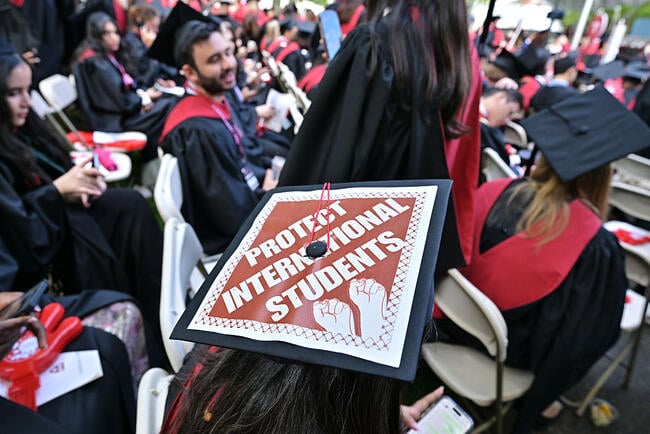You have /5 articles left.
Sign up for a free account or log in.

International students face a risk of immigration challenges under the Trump administration due to various travel bans and limitations.
Josh Reynolds/The Washington Post via Getty Images
International students have faced a barrage of challenges under the second Trump administration, including widespread revocation of their legal standing in a federal database and, most recently, a travel ban impacting students from 19 countries. Now, many are not sure whether they can go home for the summer break, or if they’ll be able to return if they do.
Some have been impacted by other scholars who were detained or deported while traveling back to the U.S.
While a significant number of colleges and universities have advised students not to leave the country, a smaller share have provided avenues to support students who choose to stay. In a May webinar hosted by NAFSA, the association of international educators, nearly half of attendees indicated that their institution is not offering financial support (such as discounted tuition, rent subsidies, on-campus jobs or emergency funds) for international students during the summer term.
A new fear: Earlier this year, many colleges and universities advised international students to be cautious when planning travel for academic breaks. The University of Washington’s international student services office told students on May 12 that while “there have been no policy changes to travel rules for F-1 and J-1 students … there is always risk with international students” and advised them to consider their individual situations before making plans to leave the U.S.
At George Washington University in Washington, D.C., “I know a lot more students in the international student body in general are not going home this summer—they’re staying here just because they don’t want to risk it,” Rohan Kapur, vice president of the International Student Association, told DW-TV.
Immigration lawyers say students who choose to leave risk heavy vetting on their return and urge them to weigh the benefits of travel against the additional anxiety and stress they may experience when they come back.
In NAFSA’s webinar, CEO Fanta Aw noted that graduate students often stay near campus during the summer, and that some students cannot afford to travel home. “What I think is unusual this time around is that, even the students who normally will think about going home, they may decide not to go home this time, especially if they have to renew their visas,” Aw said.
Bridging the gap: Some institutions, however, are identifying ways to ensure international students can remain in the U.S. for the summer. The supports they offer include career development programs, certificate courses and volunteer opportunities, said Joann Ng Hartmann, senior impact officer at NAFSA.
“Despite recent executive orders creating a chilling effect, U.S. institutions are working hard to share their welcoming stories and unique experiences for international students,” Hartmann said.
For students who have made arrangements to stay somewhere other than their college town for the summer, identifying housing or work opportunities can be difficult. A few institutions are relying on donor funds to mitigate such challenges for students.
Whitman College in Washington State launched an international student support fund to provide housing, meals and job opportunities. As of June 11, the fund had raised just over $27,400. Macalester College in St. Paul is offering students free housing for the summer, funded by a donor gift of $250,000. The college can provide room and board for 65 students, accommodating about 20 percent of the college’s international population.
Other colleges are broadening eligibility for on-campus housing opportunities this summer.
Dartmouth College sent an email to international students from countries impacted by the travel ban Trump signed into order June 9, according to the student newspaper, The Dartmouth. Arizona State University is expanding summer housing options to all international students, regardless of whether they’re taking classes or working on-campus jobs, according to The Wall Street Journal.
Offering summer courses is one way universities can help international students remain in compliance, but financial aid packages don’t always cover summer studies, Amanda Kelso, associate vice provost for undergraduate education at Duke University, said during NAFSA’s webinar. Therefore administrators should consider both the cost and the modality of summer classes; some students are staying in other regions of the U.S. with family or friends who can host them, making online and free courses better options, Kelso said.
On-campus research and employment opportunities can be another way to address financial gaps students may experience by staying in the U.S. An institution’s international student office can employ graduate students, Jenny Bowen, director of international student advising at Indiana University at Bloomington, said during NAFSA’s webinar, or colleges can leverage partnerships across divisions and departments.
Local businesses in some regions are also ready to welcome international students for summer employment positions. Tourist towns across the Eastern Seaboard say they’re expecting students to live and work in the region temporarily, despite the immigration crackdowns, The Virginian-Pilot reported.
How is your campus supporting international student persistence and retention? Tell us more.




